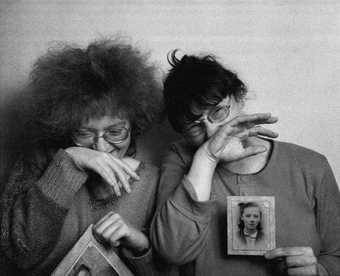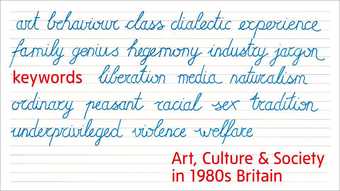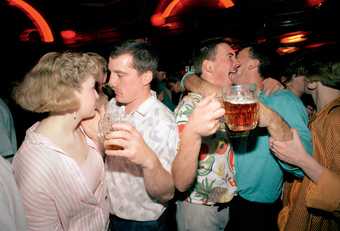The first photograph I took after I finished college was of the cover of a book, Putting Myself in the Picture by Jo Spence, the British photographer, writer and ‘cultural sniper’ – as she described herself. It was the late 1980s, ‘re-photography’ was in and Roland Barthes had long declared the death of the author, but I still wanted to pay homage to the texts that were crucial to what I was thinking about photography. Her work had had a big impact on me while I was a student. It taught me how even the most simple and natural photographs are affected by the cultural and economic circumstances in which they are taken and circulated. Her way of working in collaboration with other people, and annotating old photographs into new meanings, made me realise how all images are in some way a collaboration, involving not only sitters and photographers, but also the people who will go on to include them in albums, publications or displays, talk or write about them, and decide to pass them on or throw them away.
Other women artists put themselves in the picture using photography – Ana Mendieta, Annette Messager, Helen Chadwick and Cindy Sherman are just a few examples – but Spence’s work has a raw, hard-hitting simplicity that stands out, perhaps because it was made not for art but to change the world, even if through education rather than revolution.
The photographs she produced with Terry Dennett (a former partner and longterm collaborator) and Rosy Martin are still compelling for their liberating disregard of the preoccupation with beauty, elegance, or just ‘cool’ that is ever-present in photographic culture. The courage with which they confront fears and contradictions in relation to embodied sexual identity and our desires as workers and consumers is almost alarming. They make us question boundaries between the personal and the political, the private and the public, and the extent to which we can ever be in control of our body, our image, or ourselves. The commitment involved in these collaborations is almost palpable, a way of living and working embedded in a wider political and feminist project whose urgency seems only intensified by Spence’s heightened awareness of her own mortality. Yet even as they address the most serious of themes – unemployment, oppression, illness – the images can still be funny and playful.

‘Rosy and I begin a photo therapy session in which we examine the silences and absences of our school photos.’ – Jo Spence
© Jo Spence
I met her a few times, most memorably when she invited me to her home so I could show her my portfolio. She had been one of the external examiners where I studied for a degree in photography, and it is probably thanks to her that I graduated with first-class honours. As someone who had first tried (and failed) to get into college with a portfolio of ‘family photographs’ taken by other people, I too was interested in exploring political and photographic autobiography. Spence was immensely generous with her time and advice – which, with the arrogance of youth, I mostly disregarded. Her influence was crucial, however, when I became more interested in writing than taking pictures. It was while looking at her reworking of the family album that I first wondered about its history as a women’s genre, a curiosity that eventually resulted in my first book, Women’s Albums and Photography in Victorian England. As I discovered, writing history can also be a way to add new meanings to old photographs.
Recently, Dennett donated to Birkbeck (where I now teach history of photography) a collection of books and journals that had belonged to both him and Spence. As new students delve into Spence’s work, I once again discover just how inspiring and empowering it can be, not just as history, but as a means to understand the present in ways that make us less passive towards our circumstances.


